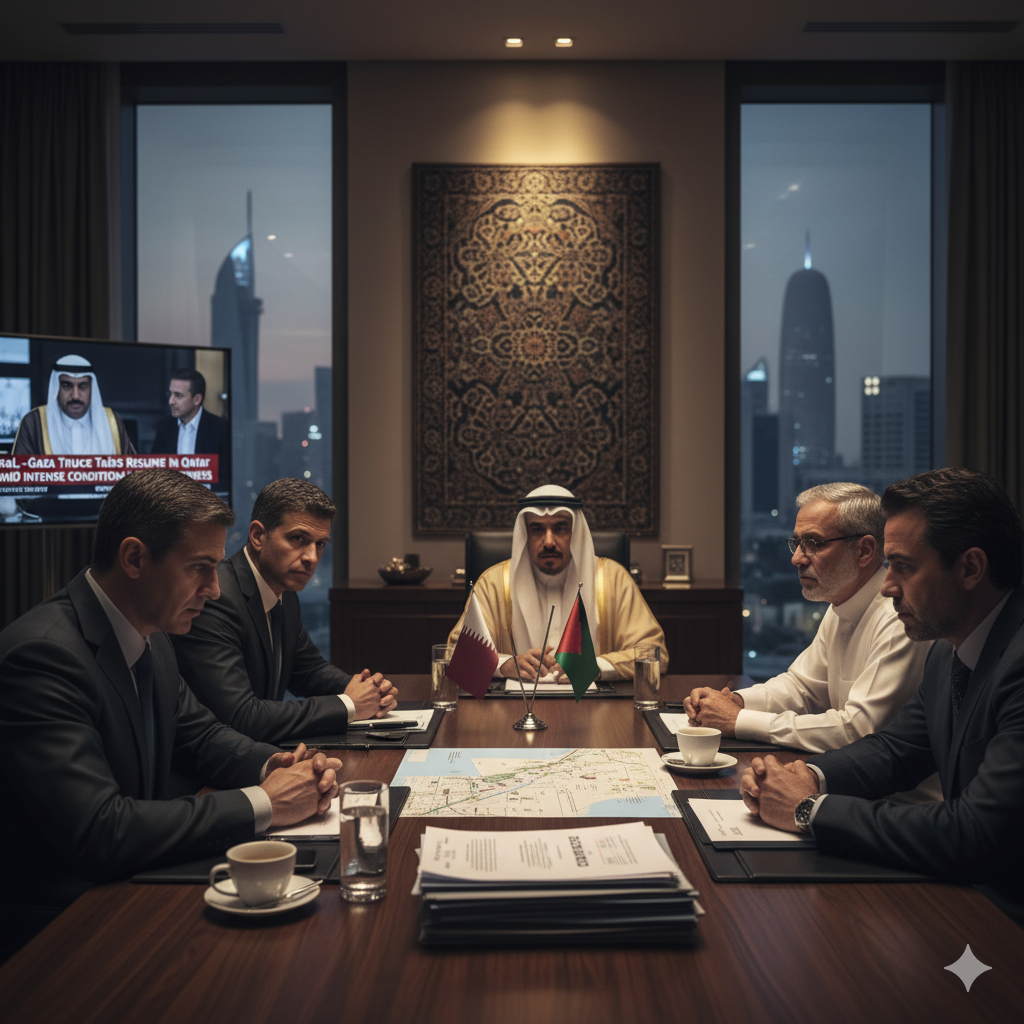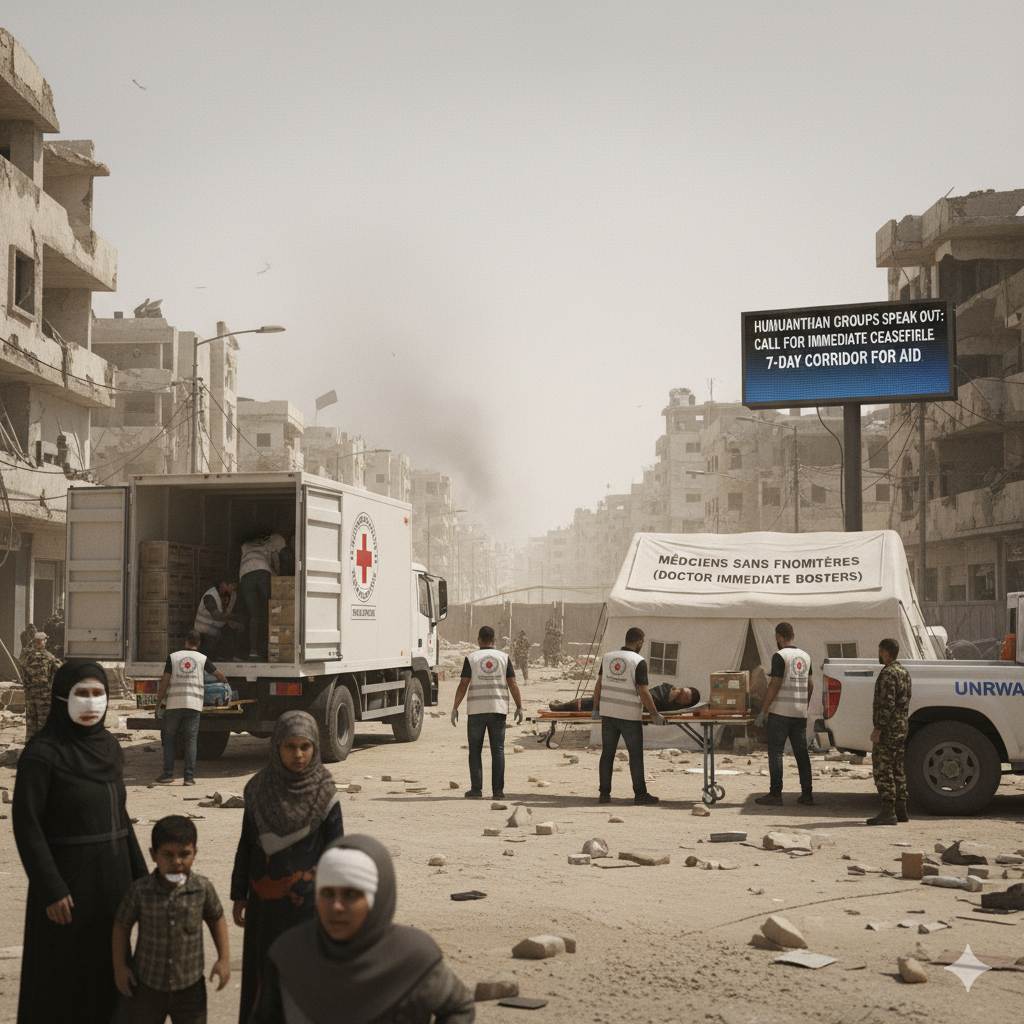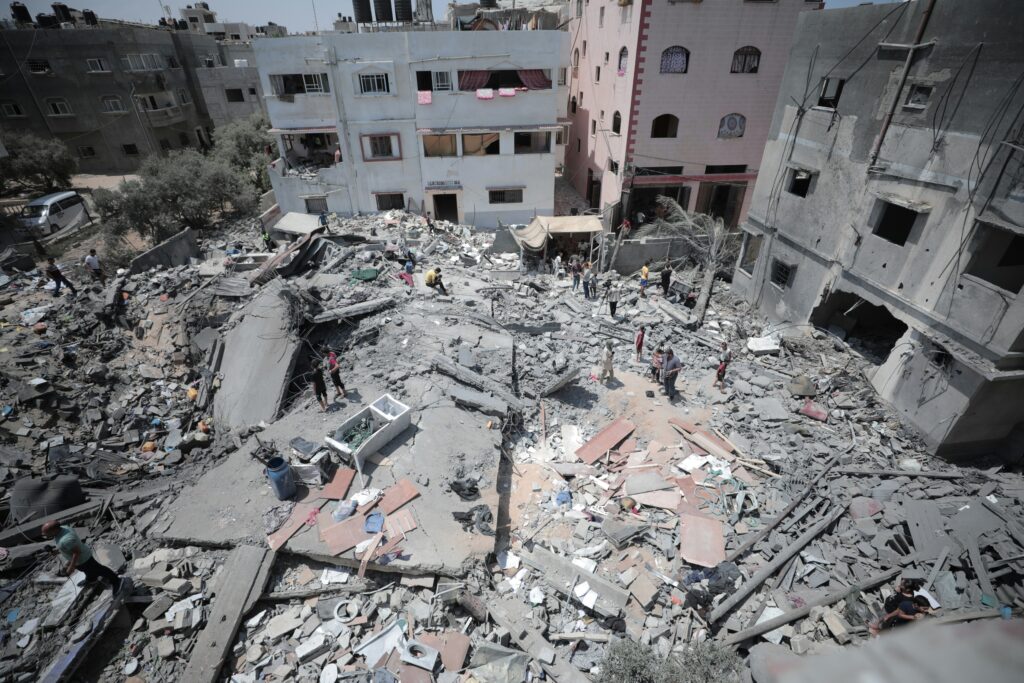Israel–Gaza truce talks have regained international attention as mediators from Egypt, Qatar, and the United States convene in Doha with a renewed push to create a 7-day humanitarian halt in hostilities. This critical meeting offers a fragile sense of hope for civilians in the region, battered by months of escalating violence and dire humanitarian conditions in Gaza.
Table of Contents
- Introduction: Hope Rekindled
- The Current State of the Israel–Gaza Truce Talks
- Key Mediators and Their Roles
- Points of Agreement and Stalemates
- Humanitarian Impact of a Potential Truce
- Deep Dive: Conditional Willingness from Both Sides
- Prisoner Exchange: The Major Hurdle
- International Reactions and Diplomatic Pressure
- Social Media and Public Sentiment
- Next Steps: Awaiting the Joint Statement
- Conclusion: The Road Ahead
- References
1. Introduction: Hope Rekindled
The Israel–Gaza truce talks that have resumed in Qatar this week have drawn international scrutiny and cautious optimism. The world watches closely as the humanitarian crisis in Gaza deepens with each passing day, and both Israelis and Palestinians hold their breath for respite.
Since October, the violence and retaliatory operations have left thousands dead, millions displaced, and basic infrastructure in ruins. Previous attempts at brokering peace have faltered, often derailed by deep mistrust, militant attacks, and a vexing political impasse. Now, a new round of dialogue—brokered by Qatar’s seasoned diplomats, Egypt’s strategic negotiators, and the United States’ top envoys—brings cautious hope to a suffering people.

2. The Current State of the Israel–Gaza Truce Talks
As the Israel–Gaza truce talks resume, senior officials from both Hamas and Israel have privately and, in some cases, publicly exhibited what sources are calling a “conditional willingness” to engage in a temporary cessation of violence. The recently intensified diplomatic push underscores urgent concern for Gaza’s civilian population, currently facing severe deprivation and ongoing bombardment.
While both parties have articulated broad support for a humanitarian pause, major sticking points persist—including the scope and terms of prisoner exchanges and the mechanisms for international oversight.
3. Key Mediators and Their Roles
Three primary players are helming the Israel–Gaza truce talks:
- Qatar: As host, Qatar acts as the principal facilitator, providing a neutral venue and leveraging its longstanding contacts with both Hamas and Western governments.
- Egypt: Egypt’s intelligence and diplomatic corps bring decades of experience brokering deals between Israeli and Palestinian actors.
- United States: The Biden administration, wary of a wider regional conflict, is exerting significant pressure on both Israel and Hamas to accept a truce.
Diplomatic Statements
In an official statement, Qatari envoy Dr. Majid Al-Ansari underscored Doha’s commitment: “Qatar remains fully dedicated to supporting dialogue and achieving a sustainable humanitarian solution for Gaza.”
U.S. State Department officials reiterated American calls for both sides to put civilians first, while Egyptian mediators stressed the importance of mutual confidence-building measures.
4. Points of Agreement and Stalemates
Despite their differences, Israeli and Hamas representatives have loosely agreed on several issues during the ongoing Israel–Gaza truce talks:
- Duration: A potential 7-day truce, prioritizing urgent humanitarian relief.
- Humanitarian Access: Allowing medical aid, food, clean water, and fuel to reach Gaza through existing crossings.
- Ceasefire Monitoring: Discussing possible third-party (e.g., United Nations) oversight.
However, contentious issues remain unresolved:
- Prisoner Exchange Details: Numbers, identities, and terms of exchange continue to divide negotiators.
- Scope of Ceasefire: Parameters over permissible military activities during and after the truce.
- Safety Guarantees: For aid workers and hostages.
5. Humanitarian Impact of a Potential Truce
The dire humanitarian situation in Gaza is central to the urgency of the Israel–Gaza truce talks. More than two million civilians lack stable access to food, water, and healthcare due to siege tactics and frequent airstrikes.
Humanitarian Groups Speak Out
International Red Cross, Médecins Sans Frontières (Doctors Without Borders), and United Nations Relief and Works Agency (UNRWA) have all called for an immediate cessation of hostilities to evacuate the wounded and resume vital aid distribution. The seven-day humanitarian corridor under discussion could enable life-saving interventions for some of the world’s most vulnerable populations.

6. Deep Dive: Conditional Willingness from Both Sides
One of the defining features of the current Israel–Gaza truce talks is the “conditional willingness” expressed by both sides:
- Hamas has expressed openness to temporarily halting rocket attacks in exchange for tangible guarantees of aid entry and a comprehensive prisoner exchange.
- Israel is willing to contemplate a temporary ceasefire on the condition that Hamas ceases all cross-border hostilities and reveals information about Israeli hostages held in Gaza.
Senior U.S. officials have indicated that a back-channel line of communication is open in Doha, where indirect negotiations occur via the mediating nations.
7. Prisoner Exchange: The Major Hurdle
At the heart of the faltering Israel–Gaza truce talks lies the debate over prisoner exchanges. Hamas demands the release of hundreds of Palestinians from Israeli custody in exchange for Israeli hostages and the remains of deceased soldiers. Israel, concerned about security risks and public backlash, is reluctant to meet these demands without firm guarantees.
Negotiators are exploring phased exchanges—starting with women, children, and the sick—before addressing broader lists of prisoners.
8. International Reactions and Diplomatic Pressure
The renewed Israel–Gaza truce talks have triggered a spectrum of responses from the international community. European Union foreign policy chief Josep Borrell hailed the mediation, urging all actors to “seize the opportunity for dialogue.” U.N. Secretary-General António Guterres has repeatedly demanded compliance with international humanitarian law.
Regional Impacts
Neighboring states, including Jordan and Saudi Arabia, have encouraged swift action, fearful that continued violence may spill over and destabilize the region.
U.S. Role
The U.S. administration has reasserted its commitment to a two-state solution and is closely monitoring developments from Washington. Secretary of State Antony Blinken noted, “Meaningful progress in the Israel–Gaza truce talks could lay the foundation for broader peace negotiations.”
9. Social Media and Public Sentiment
Around the world, calls for a ceasefire have gone viral, with hashtags like #GazaCeasefire and #IsraelNews dominating Twitter, Facebook, and Instagram. Peace activists have staged demonstrations in major cities, demanding accountability and an end to civilian suffering.
Stories from Ground Zero
Testimonies from Gaza reveal heartbreak and resilience as families struggle to survive amid rubbled neighborhoods and collapsing infrastructure.

10. Next Steps: Awaiting the Joint Statement
Expectations are high for a formal joint statement from Qatar, Egypt, and the United States, which could break the current deadlock. Officials have signaled that a late-night press conference (Doha local time) is likely, where details of the emerging agreement—or the impasse—will be disclosed.
What to Watch
- Will interim agreements on prisoner exchange and aid delivery hold?
- Can trust be rebuilt sufficiently to prevent future escalations?
- Is a 7-day truce a stepping stone to longer, sustainable peace?
11. Conclusion: The Road Ahead
The revived Israel–Gaza truce talks mark a potentially pivotal moment in the region’s conflict. With the world’s eyes on Doha, the choices of these days may ripple for generations. Whether these talks yield a genuine humanitarian breakthrough—or fall prey to familiar cycles of mistrust—remains to be seen. For now, hope endures that measured, skillful diplomacy can help stem the suffering and create space for a better future.


